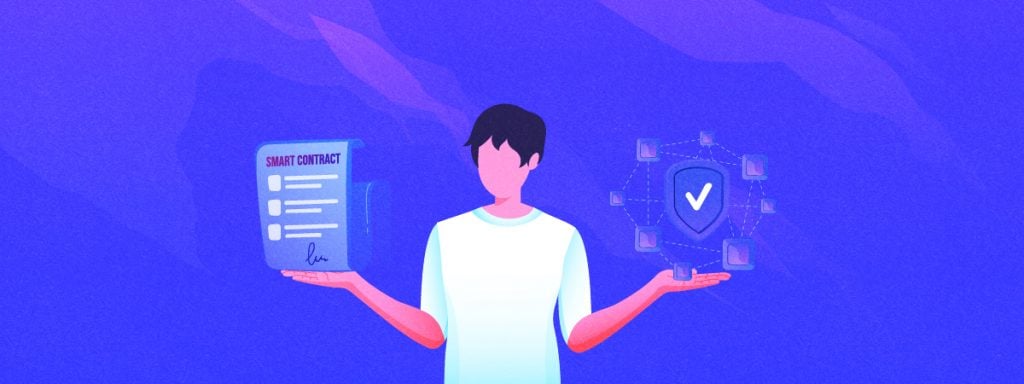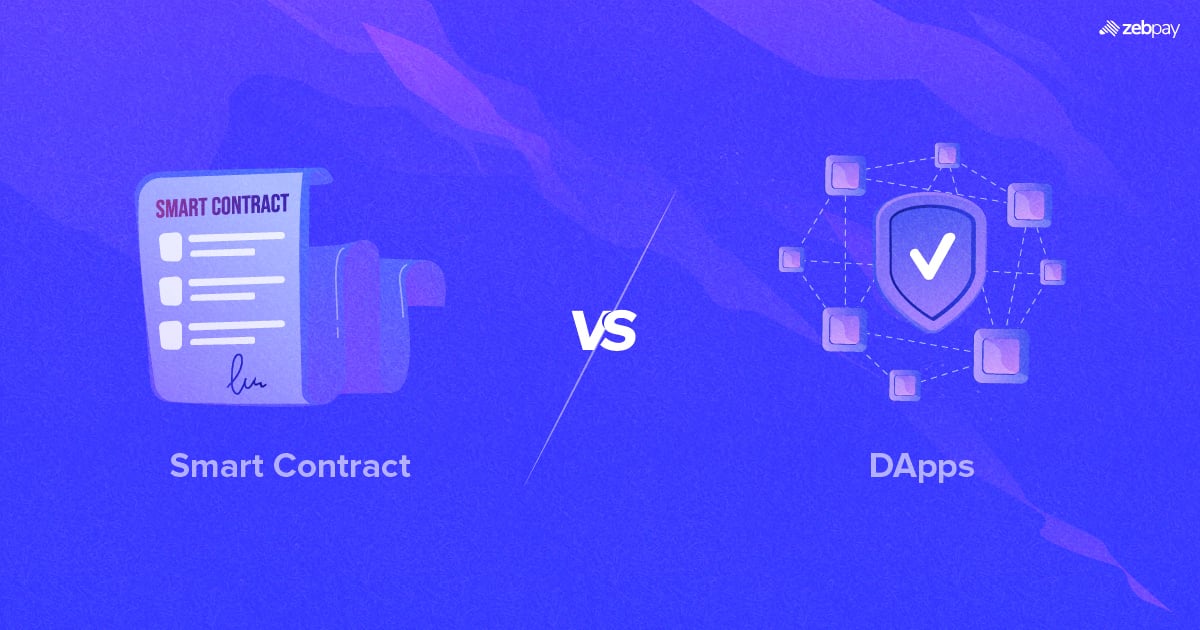Over the last few years, digitization has been one of the biggest trends of the business world. Crypto is a fantastic technology that has greatly assisted this trend through its unique applications. While most users have heard of popular terms like Bitcoin and NFTs, many do not know about the benefits of components like smart contracts or dApps. So what are they and why are they essential for blockchains?
What are Smart Contracts?
Contracts in the real world are agreements between parties to perform a task or function when its conditions are fulfilled. They are typically executed with the help of a trusted intermediary to ensure the contract is honoured by all parties involved.
Smart contracts are a digital version of such contracts. Instead of a document or paper, they are programs created on a blockchain like Ethereum. These contracts are also used to create an agreement between users but operate on a “trustless” basis. This implies there is no need for a trusted intermediary between the parties. The contract executes automatically when its conditions are met.
Beyond simple agreements, smart contracts can be used for many other applications. From creating an automatic lending fund to minting special NFTs, smart contracts form the backbone of many complex blockchain applications.
What are DApps?
Just like the apps on your phone, decentralized applications – or dApps for short – are applications that use the power of blockchain to create unique experiences on your laptop or mobile. The key difference is that there is no individual company or entity in charge of your data on the platform. This data is instead owned by you and stored on the blockchain.
Read more: Top 10 dApp Projects
Since dApps are decentralized and public, they are also open-source. Their code is publicly available for anyone to examine or use to create their own applications. The basis of a dApp is formed using smart contracts. From simple functionality like automatic transactions to the distribution of digital assets, all such tasks are handled through smart contracts.
DApps have many use cases, with the most popular one being DeFi or decentralized finance. This involves lending and borrowing money without a bank, payment solutions or even investments. Alternatively, some dApps can be games and marketplaces.
Difference Between a DApp and a Smart Contract

While both smart contracts and dApps work on the blockchain, they are not the same. As mentioned above, smart contracts are the backbones of many functions on blockchains today. This includes dApps, which means dApps function because of the existence of smart contracts.
On the other hand, smart contracts cannot be accessed by general users without an interface. dApps give us this interface in the palm of our hands and enable us to use smart contracts with the press of a button. You do not need to know how to program to use a dApp which makes it much easier to access smart contracts.
In traditional software terminology, a smart contract acts as the API while the dApp is the user interface for a program.
Smart Contract Vs DApps: Pros and Cons
| Pros of Smart Contracts | Cons of Smart Contracts |
| Processes are Automated | Vulnerabilities in code can hamper Smart Contract functioning |
| They are transparent and immutable | Difficult to create |
| No need for intermediaries | Accidental transactions cannot be undone |
Pros of Smart Contracts
- Smart contracts allow developers to automate complex tasks on a blockchain.
- Any actions made by a smart contract are irreversible and transparent. They can be viewed by all users of the platform.
- Trustlessness is a huge advantage, as there is no need for intermediaries like lawyers or banks to be sure the activity works.
Cons of Smart Contracts:
- Smart contracts are not foolproof, any bugs or vulnerabilities in the code can be detrimental.
- Smart contracts are difficult for non-programmers to create and operate.
- Since actions on a blockchain cannot be reversed, any accidental transaction or error cannot be undone.
| Pros of DApps | Cons of DApps |
| No single point of failure | Network congestion and transaction fee can be high |
| DApps are usually open-source | Updates take time to be implemented |
| Opearions have negligible down-time |
Pros of DApps
- DApps are entirely decentralized and there is no large company like Facebook or Google behind your app.
- DApps are usually open-source, which means you can verify their functionality and use the source code in your own projects.
- Since DApps operate on a distributed blockchain network, there are no centralized servers. This means hacks or server outages are rare and operations have almost no downtime.
Cons of DApps
- If a smart contract has been built on Ethereum, it may suffer from two major issues – network congestion and costly transaction fees.
- Changes take time to implement and are a complex procedure where every node on the blockchain must apply the update.
Final Thoughts
If you ever wondered, “What is a dApps?” now you know the answer is very simple. Decentralized applications are like other apps on your phone, but they use blockchain technology to bring you more benefits. Smart contracts are the programs that enable a dApp’s functionality.
As more developers become familiar with blockchains and decentralization, innovation in the dApp space is inevitable. They may become the standard for applications in the future.
Buy, sell, and manage your crypto portfolio with Zebpay. Stay up to date with the latest crypto news on ZebPay blogs.

